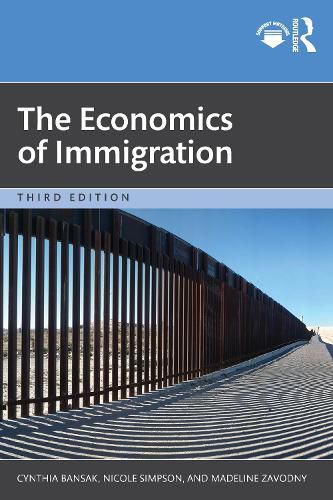Readings Newsletter
Become a Readings Member to make your shopping experience even easier.
Sign in or sign up for free!
You’re not far away from qualifying for FREE standard shipping within Australia
You’ve qualified for FREE standard shipping within Australia
The cart is loading…






The Economics of Immigration provides students with the tools needed to examine the impact of immigration and immigration policies over the past century. The main objectives of the book are for students to understand the decision to migrate, the impacts of immigration on markets and government budgets, and the consequences of immigration policies in a global context.
Students will develop an appreciation of the importance of immigration as a separate academic field within labor economics and international economics. Topics covered include the effects of immigration on labor markets, housing markets, international trade, tax revenues, human capital accumulation, government fiscal balances, and climate migration. The book also considers the impacts of immigration on what firms choose to produce, the ethnic diversity of restaurants, and financial markets, as well as the theory and evidence on immigrants' economic assimilation. The textbook includes comparisons of immigration policies in a number of immigrant-receiving and sending countries, highlighting recent policy changes in Europe. Finally, the book explores immigration topics that directly affect low- and middle-income countries, such as remittances, brain drain, and human trafficking. Readers will be fully equipped with the tools needed to understand and contribute to policy debates on this controversial topic.
This is the first textbook to comprehensively cover the economics of immigration, and it is suitable both for economics students and for those studying migration in other disciplines, such as sociology and political science.
$9.00 standard shipping within Australia
FREE standard shipping within Australia for orders over $100.00
Express & International shipping calculated at checkout
The Economics of Immigration provides students with the tools needed to examine the impact of immigration and immigration policies over the past century. The main objectives of the book are for students to understand the decision to migrate, the impacts of immigration on markets and government budgets, and the consequences of immigration policies in a global context.
Students will develop an appreciation of the importance of immigration as a separate academic field within labor economics and international economics. Topics covered include the effects of immigration on labor markets, housing markets, international trade, tax revenues, human capital accumulation, government fiscal balances, and climate migration. The book also considers the impacts of immigration on what firms choose to produce, the ethnic diversity of restaurants, and financial markets, as well as the theory and evidence on immigrants' economic assimilation. The textbook includes comparisons of immigration policies in a number of immigrant-receiving and sending countries, highlighting recent policy changes in Europe. Finally, the book explores immigration topics that directly affect low- and middle-income countries, such as remittances, brain drain, and human trafficking. Readers will be fully equipped with the tools needed to understand and contribute to policy debates on this controversial topic.
This is the first textbook to comprehensively cover the economics of immigration, and it is suitable both for economics students and for those studying migration in other disciplines, such as sociology and political science.